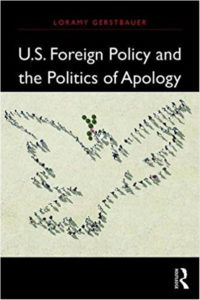
U.S. Foreign Policy and the Politics of Apology
Loramy Gerstbauer
Routledge (2016)
Rs14,751
Acts of contrition and transitional justice?admission of wrong, apology, and reparations?have become fashionable in the discourse of international affairs. Using a case-study approach that inspires student discussion of concrete examples, this text addresses important questions about the politics of apology in relation to some of the most controversial cases of US foreign policy over the past fifty years: Vietnam, Nicaragua, and the most recent war in Iraq. Loramy Gerstbauer offers an original, transdisciplinary, and accessible argument for the practical value of contrition, forgiveness, and reconciliation in international relations while examining why the United States has been a less than contrite nation and offering a prescription for how to change this state of affairs.
International relations scholars have paid considerable attention to transitional justice, mainly via court trials and truth commissions. Less attention has been paid to apologies or, as presented here, acts of contrition. Loramy Gerstbauer’s systematic and well-written study helps fill that void with attention to U.S. statements and policies regarding Vietnam, Nicaragua, and Iraq. The question of how a state should address past controversial (if not misguided) policies remains complex, but anyone interested in that topic will profit from Gerstbauer’s careful analysis and reflection. (David P. Forsythe, University of Nebraska-Lincoln)
What would it take for the lone superpower to apologize for the past wrongs of its foreign policy? Loramy Gerstbauer takes a gutsy intellectual risk by exploring the “unlikely case” in the growing literature on apologies in global politics. Acknowledging that interests cannot be ignored, she shows through the cases of Vietnam, Nicaragua, and Iraq/the War on Terror that identities are even more important?leaving us with hope that leadership can make a difference for contrition. (Daniel Philpott, University of Notre Dame)
Focusing on U.S. involvement in Vietnam, Nicaragua, and Iraq, this book presents a cogent and compelling analysis of why contrition can be an essential element in American foreign policy?and the enormous obstacles that might well prevent this from taking place. (Mark Gibney, University of North Carolina-Asheville)
Loramy Gerstbauer’s book makes a rare, valuable effort to address the lack of contrition by the U.S. for its wrongdoings in postwar interventions. Although reconciliation would be important to U.S. identity and foreign relations, Gerstbauer argues convincingly that it is a difficult task given the complex strategic, cultural, and domestic political conditions existing on both sides of conflicts. Her case studies of Vietnam, Nicaragua, and Iraq are particularly enriched by interviews with officials, veterans, activists, victims, and expats from both the U.S. and its former enemy country. (Yinan He, Lehigh University)
In this stimulating and provocative book, Gerstbauer explores the possibilities and limitations of contrition in promoting a just world order based on three U.S. interstate conflicts?Vietnam, Nicaragua, and Iraq. This study is an important contribution to the scholarship on international political ethics. (Mark Amstutz, Wheaton College)
Loramy Gerstbauer is Associate Professor of Political Science and Peace Studies at Gustavus Adolphus College.
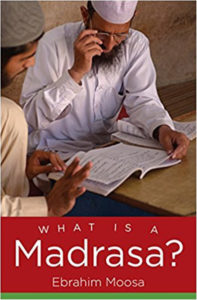
What Is a Madrasa?
Ebrahim Moosa
University of North Carolina Press (2015)
Rs11, 473
Taking us inside the world of the madrasa—the most common type of school for religious instruction in the Islamic world—Ebrahim Moosa provides an indispensable resource for anyone seeking to understand orthodox Islam in global affairs. Focusing on postsecondary-level religious institutions in the Indo-Pakistan heartlands, Moosa explains how a madrasa can simultaneously be a place of learning revered by many and an institution feared by many others, especially in a post-9/11 world.
Drawing on his own years as a madrasa student in India, Moosa describes in fascinating detail the daily routine for teachers and students today. He shows how classical theological, legal, and Qur’anic texts are taught, and he illuminates the history of ideas and politics behind the madrasa system. Addressing the contemporary political scene in a clear-eyed manner, Moosa introduces us to madrasa leaders who hold diverse and conflicting perspectives on the place of religion in society. Some admit that they face intractable problems and challenges, including militancy; others, Moosa says, hide their heads in the sand and fail to address the crucial issues of the day. Offering practical suggestions to both madrasa leaders and U.S. policymakers for reform and understanding, Moosa demonstrates how madrasas today still embody the highest aspirations and deeply felt needs of traditional Muslims.
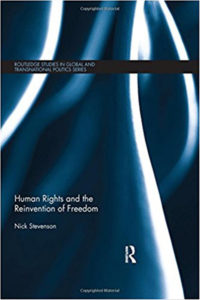
Human Rights and the Reinvention of Freedom
Nick Stevenson
Routledge (2016), Rs13,931
This volume seeks to propose a reinvention of freedom under contemporary conditions of globalization, cross-border mobility, and neo-liberal dominance. There are currently two predominant myths circulating about freedom. The first is that in a global age growing numbers of citizens are less concerned with freedom than they are with security. Secondly, there is the presumption that freedom only refers to market freedom and consumerism, implying that the ideas of choice and consumption are interchangeable with ideas of freedom.
Stevenson argues that while these arguments are significant, they are deeply misleading. More ‘authentic’ ideas of freedom such as self-realisation, participating in politics and seeking a meaningful life of self-reflection have not been entirely displaced but have instead become reinvented in our global times. The cries of freedom can still be heard in a multitude of places from the Arab Spring to the Occupy Movement and from the protests against European austerity to the current popularity of human rights. Stevenson also argues that the idea of freedom has become increasingly mobile in our interconnected and transnational society. The spaces and places of civil society are more complex in this global age, pushing ideas of freedom far beyond the usual arena of national politics.
This volume brings together a diverse range of cultural interpretations in respect of freedom related to the idea of the commons, cosmopolitanism, contemporary documentary cinema and the history of jazz music. Exploring the ways in which notions of freedom are being re-made within the context of the present, and looking more precisely at the current threats to freedom, it will be of interest to students and scholars of globalization, human rights and cultural sociology.
Nick Stevenson is Reader in Cultural Sociology in the School of Sociology and Social Policy at the University of Nottingham, UK.
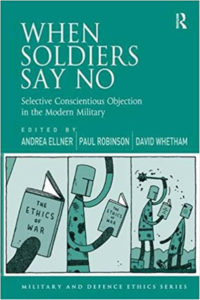
When Soldiers Say No: Selective Conscientious Objection in the Modern Military
Andrea Ellner,? Paul Robinson,? David Whetham
Routledge (2014)
Rs10,653
Traditionally few people challenged the distinction between absolute and selective conscientious objection by those being asked to carry out military duties. The former is an objection to fighting all wars - a position generally respected and accommodated by democratic states, while the latter is an objection to a specific war or conflict - theoretically and practically a much harder idea to accept and embrace for military institutions. However, a decade of conflict not clearly aligned to vital national interests combined with recent acts of selective conscientious objection by members of the military have led some to reappraise the situation and argue that selective conscientious objection ought to be legally recognised and permitted. Political, social and philosophical factors lie behind this new interest which together mean that the time is ripe for a fresh and thorough evaluation of the topic. This book brings together arguments for and against selective conscientious objection, as well as case studies examining how different countries deal with those who claim the status of selective conscientious objectors. As such, it sheds new light on a topic of increasing importance to those concerned with military ethics and public policy, within military institutions, government, and academia.
Andrea Ellner is in the Defence Studies Department of King’s College London, UK.
Paul Robinson is a professor in the Graduate School of Public and International Affairs at the University of Ottawa, Canada.
David Whetham is Senior Lecturer in Defence Studies at King’s College London, based at the Joint Services Command and Staff College at the UK Defence Academy.
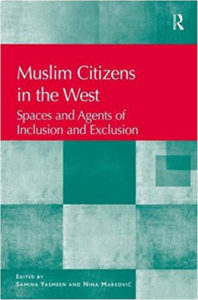
Muslim Citizens in the West: Spaces and Agents of Inclusion and Exclusion
Nina Markovi,? Samina Yasmeen
Routledge (2014)
Rs12,292
Drawing upon original case studies spanning North America, Europe and Australia, Muslim Citizens in the West explores how Muslims have been both the excluded and the excluders within the wider societies in which they live. The book extends debates on the inclusion and exclusion of Muslim minorities beyond ideas of marginalisation to show that, while there have undoubtedly been increased incidences of Islamophobia since September 2001, some Muslim groups have played their own part in separating themselves from the wider society.
The cases examined show how these tendencies span geographical, ethnic and gender divides and can be encouraged by a combination of international and national developments prompting some groups to identify wider society as the ‘other’. Muslim and non-Muslim scholars and practitioners in political science, social work, history and law also highlight positive outcomes in terms of Muslim activism with relationship to their respective countries and suggest ways in which increasing tensions felt, perceived or assumed can be eased and greater emphasis given to the role Muslims can play in shaping their place in the wider communities where they live.
‘Few books have managed to illuminate the experience of Muslims in the West as effectively as this one. The richly textured analysis of attitudes, perceptions and strategies ranges across the different social and political landscapes of Europe, Australia, North America and even India and Singapore. In each case the complex exclusion/inclusion dynamic that operates as much within as between minorities and majorities is treated with subtlety and much insight,’ writes Joseph Camilleri of La Trobe University, Australia.
Professor Samina Yasmeen is Director of Centre for Muslim States and Societies and lectures in Political Science and International Relations in the School of Social and Cultural Studies, the University of Western Australia (UWA), Perth.
Professor Yasmeen is a specialist in political, and strategic developments in South Asia(particularly Pakistan), the role of Islam in world politics, and citizenship among immigrant women.
Nina Markovia from the Centre for European Studies, Australian National University, is an expert in European politics and societies. Her research focuses on the role of discourses, nationalism and ethnic identities in foreign policy. She has published numerous academic works with a particular focus on the European Union, Iran, Western Balkans and Russia. She has worked in the Australian Federal parliamentary research service as a Senior Researcher for Europe and Middle East.

